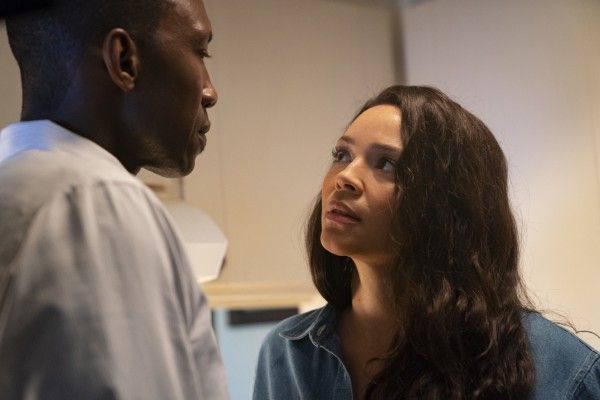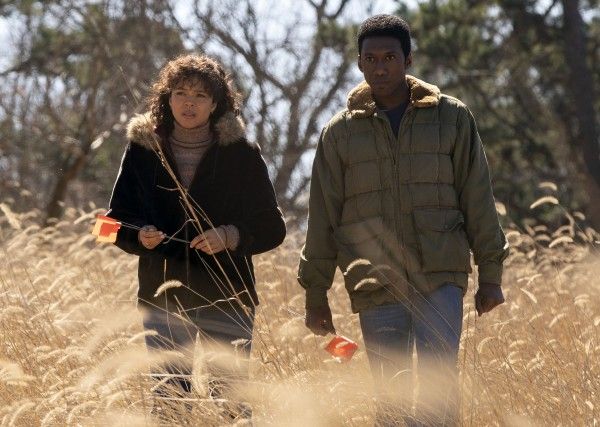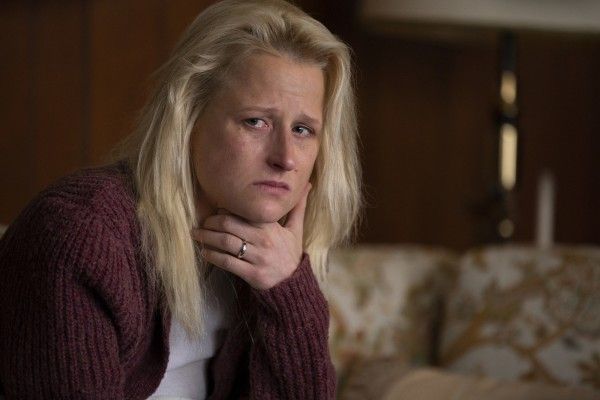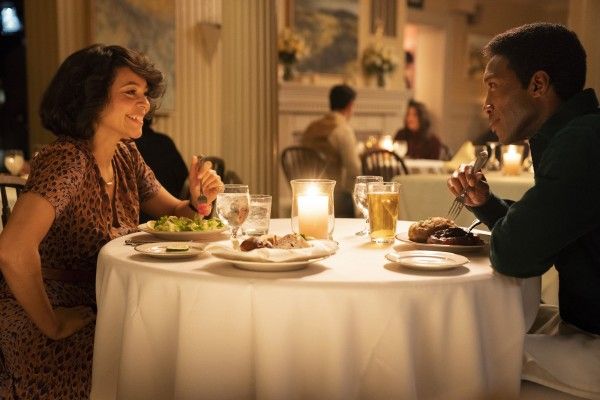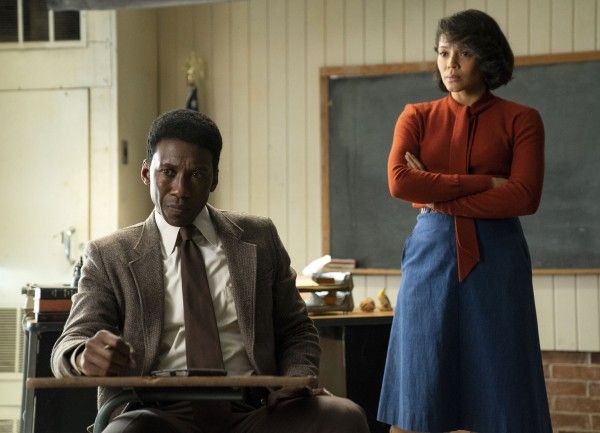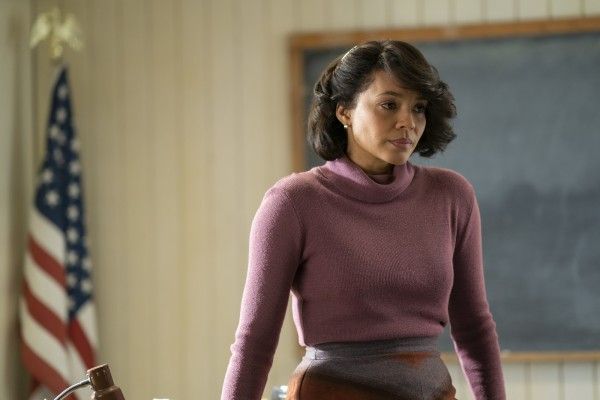For all the critical praise Season 1 of True Detective received back in 2014, it was hard to ignore the representation of women as faceless victims, nagging wives, and sexual playthings. An examination of masculinity doesn’t have to eschew women having agency or even a modicum of an interior life. In Season 2, creator Nic Pizzolatto attempted to address this criticism by introducing a female investigator, Detective Ani Bezzerides (Rachel McAdams). Despite an excellent performance from McAdams, this character read as another clichéd archetype; she’s just one of the guys who isn’t going to let any female weakness stand in the way of a case. There is a reason why the Kroll Show sketch “Dead Girl Town” still resonates four years after it aired; it perfectly skewers the disposable victims and the “troubled genius” men who are here to solve the crime.
Cut to True Detective Season 3, which has returned to a crowded TV landscape not as the hailing critical champion, but a show with something to prove — including if Pizzolatto can avoid the issues that have plagued this anthology series in the past. Casting has never been the issue, but nagging wives who act as an obstacle or justify the bad behavior of the central characters are unappealing, no matter who is playing the part. However, at this halfway point of Season 3, middle-school-teacher-turned-best-selling author Amelia (Carmen Ejogo) is proving to be much more than just an argumentative or supportive girlfriend/wife, and the show explores that in a few different ways.
The three timeline format mirrors Wayne Hays’ (Mahershala Ali) fragmented memories; each episode reveals another piece of the puzzle while tossing up even more questions. The case of the missing Purcell kids is the thread linking 1980, 1990 and 2015. Each period plays out a part of Wayne’s relationship with Amelia, in which we see their blossoming romance, followed by a marriage in strife, and culminating with his profound loneliness caused by her absence. It’s like the start of Up, except non-linear — and there’s a lot more arguing/make-up sex.
Investigating the disappearance of young children is not the ideal scenario for a meet-cute — I doubt Nancy Meyers is going to take inspiration for her next rom-com from this season — but it is clear from Wayne and Amelia’s first interaction that something is bubbling beneath the surface. A teacher with aspirations to become a writer is also perfect material; Amelia is smart, ambitious and empathetic. She also has somewhat of a mysterious past, and doesn’t offer up specifics, just a vague notion of trouble. (A beguiling woman who doesn’t like to share too much falls squarely into the noir or hardboiled detective fiction camp). Over drinks, she talks about her return to Arkansas from San Francisco in 1974 after “Some things happened, not good.” In this week’s episode “The Hour and the Day” she explains during their first dinner date, “I used to be something of a mess.” Hays is left piecing together information in both 2015 and 1980.
In the early stages of a relationship, it is not unusual to withhold, but Amelia is particularly adept at deflecting back to Wayne. When he asks about her family, she asks about his love life without answering his original question. She talks about how much she enjoyed pretending to be someone else when staying in a hotel in St. Louis. Nobody knew her, so she made up a backstory. That kooky kind of detail would read as a fun quirk veering into Cool Girl territory if this was a romantic comedy, but as this is a crime series it suggests Amelia doesn’t have an issue with lying or manipulating for her gain. Ejogo plays these scenes so subtly, it is thrilling to see how her face shifts as Amelia is figuring out how to play a conversation. She puts this talent into practice when she obtains information from the police in 1990; she tells the detectives her ex is a cop, and flirts it up a storm. It’s a performance she giddily tells her not-so-ex husband about, but of course Wayne is not thrilled, especially when he later finds out she embellished by saying she was divorced.
Amelia is a woman with ambition, which is a precarious position for a character like this in a show that has not had the best track record with its female characters. When she meets Wayne, he is confident in his abilities as a detective, even if he still bears the mental scars of the war she protested against. His star has not yet fallen, hers is yet to rise. In the middle timeline, there is a great strain on this marriage as the power dynamic has shifted. Her soon-to-be bestseller “Life and Death and the Harvest Moon: Murder, a Child Abduction, and the Community Destroyed” — quite the wordy title — will later become Wayne’s salvation in remembering the details of this case, but in 1990 he can barely look at it. The Purcells represent pain and triumph for this couple; in their big blowout fight in Episode 4, he even accuses her of using this tragedy to get something better.
Another confrontation in “The Hour and the Day” points to a different Season 3 character shortcoming. “I’ve got the soul of a whore,” Lucy Purcell (Mamie Gummer) tells Amelia when she comes bearing items Lucy’s children made at school. Lucy is a mess; she was an absent mother who ran around on her husband, and his daughter might not even be his. Lucy isn’t offered much of an interior life; she cries about the shitty job she did as a parent, followed by a paranoid, expletive-filled rant when Amelia mentions Wayne. Unlike Tom (Scoot McNairy) she is not offered a chance of redemption; she died from an overdose two years before it is discovered that Julie is alive. Even without a female corpse, dead women still somehow litter the margins of True Detective.
In the story’s present day, a tenacious documentary filmmaker potentially holds the key to unlocking Wayne’s memory, but she too is withholding. Elisa (Sarah Gadon) is smart and ambitious; true crime reporting in this current decade is favored by the screen or podcasts rather than on the page. On the surface, Elisa is a lot like Amelia, but unlike Amelia, we know very little about her. Wayne suspects his son Henry (Ray Fisher) is following in his old man’s footsteps, not just in his chosen career but the woman he is attracted to. Again, it is hard to see Elisa as anything but a stepping stone for the male characters, as a device for Wayne to bristle against.
The loss of Amelia does have a profound impact on Wayne's abilities to navigate the world, though. He is estranged from his daughter — we have not found out the why of this mystery yet — and he uses Amelia’s research to jumpstart his own memories. He converses with her ghost, but she is not the only dead person haunting his waking moments. There are too many gaps at this point between the flirty couple we see in 1980 and the one ten years later who are barely holding it together, to get a full picture of this relationship. For all the forward steps taken, parts of Amelia’s character still read as a cipher for exploring the man at the center of the story. In the 2015 timeline, she is no more than a specter helping Wayne delve deeper into the case that is the reason they met in the first place.
Previous women on True Detective have lacked agency, so it is notable that Amelia accuses Wayne of not possessing any, particularly when she is going out and getting shit done. She calls out his self-pity and his ability to blame his problems on external forces. Resentment and bitterness can ruin a marriage, but instead of storming out, Amelia takes off her underwear and they fuck their anger away. Again, this is a deflection, but to what end? There are some interesting and compelling theories about Amelia out there, which are particularly hard to ignore in moments like this.
True Detective branching out into a storyline based around a long-term romance is unexpected, but love can happen in the strangest of places. At this halfway point of Season 3, Amelia is proving to be a complicated character who is doing more than simply supporting or antagonizing Wayne. She is valuable to the case in her interactions with her future husband, the bereaved parents, and the kids in her class. It's a strong start, however, there are limitations to this role because in the present she is simply a memory of an unreliable narrator. As the pieces fall into place, hopefully the resolution of Amelia’s character won’t be one we want to forget about.
True Detective Season 3 airs Sunday nights on HBO.


